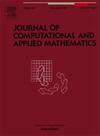Weak dangling block reordering and multi-step block compression for efficiently computing and updating PageRank solutions
IF 2.1
2区 数学
Q1 MATHEMATICS, APPLIED
Journal of Computational and Applied Mathematics
Pub Date : 2024-10-25
DOI:10.1016/j.cam.2024.116332
引用次数: 0
Abstract
The PageRank model is a powerful tool for network analysis, utilized across various disciplines such as web information retrieval, bioinformatics, community detection, and graph neural network. Computing this model requires solving a large-dimensional linear system or eigenvector problem due to the ever-increasing scale of networks. Conventional preconditioners and iterative methods for general linear systems or eigenvector problems often exhibit unsatisfactory performance for such problems, particularly as the damping factor parameter approaches 1, necessitating the development of specialized methods that exploit the specific properties of the PageRank coefficient matrix. Additionally, in practical applications, the optimal settings of the hyperparameters are generally unknown in advance, and networks often evolve over time. Consequently, recomputation of the problem is necessary following minor modifications. In this scenario, highly efficient preconditioners that significantly accelerate the iterative solution at a low memory cost are desirable. In this paper, we present two techniques that leverage the sparsity structures and numerical properties of the PageRank system, as well as a preconditioner based on the computed matrix structure. Experiments demonstrate the positive performance of the proposed methods on realistic PageRank computations.
弱悬挂区块重排序和多步区块压缩,用于高效计算和更新 PageRank 解法
PageRank 模型是一种强大的网络分析工具,广泛应用于网络信息检索、生物信息学、群落检测和图神经网络等多个学科。由于网络规模不断扩大,计算该模型需要求解一个大维度线性系统或特征向量问题。针对一般线性系统或特征向量问题的传统预处理和迭代方法在此类问题上的表现往往不能令人满意,尤其是当阻尼系数参数接近 1 时,因此有必要开发利用 PageRank 系数矩阵特定属性的专门方法。此外,在实际应用中,超参数的最佳设置通常是事先未知的,而且网络往往会随着时间的推移而演变。因此,在稍作修改后,必须重新计算问题。在这种情况下,我们需要高效的前提条件器,以较低的内存成本显著加速迭代求解。在本文中,我们介绍了利用 PageRank 系统的稀疏性结构和数值特性的两种技术,以及基于计算矩阵结构的前置条件器。实验证明了所提方法在实际 PageRank 计算中的良好性能。
本文章由计算机程序翻译,如有差异,请以英文原文为准。
求助全文
约1分钟内获得全文
求助全文
来源期刊
CiteScore
5.40
自引率
4.20%
发文量
437
审稿时长
3.0 months
期刊介绍:
The Journal of Computational and Applied Mathematics publishes original papers of high scientific value in all areas of computational and applied mathematics. The main interest of the Journal is in papers that describe and analyze new computational techniques for solving scientific or engineering problems. Also the improved analysis, including the effectiveness and applicability, of existing methods and algorithms is of importance. The computational efficiency (e.g. the convergence, stability, accuracy, ...) should be proved and illustrated by nontrivial numerical examples. Papers describing only variants of existing methods, without adding significant new computational properties are not of interest.
The audience consists of: applied mathematicians, numerical analysts, computational scientists and engineers.

 求助内容:
求助内容: 应助结果提醒方式:
应助结果提醒方式:


